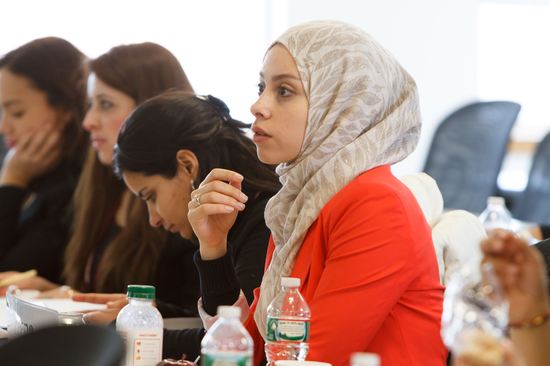Women are drivers of economic success. Bolstered by new research suggesting that training and education for women entrepreneurs directly correlates with increased revenues and job creation in emerging economies, Harvard Kennedy School partnered with Goldman Sachs Foundation and the U.S. Department of State to support female entrepreneurs in the Middle East and North Africa (MENA) with an intensive leadership training program built on a core premise: economic opportunity for women is opportunity for all.
For two weeks in March, 29 entrepreneurs from across the MENA region sank their teeth into the 10,000 Women Entrepreneurship Program, a next-generation effort of Goldman Sach's 10,000 Women initiative focused on building elements for leadership success. Following networking and mentorship opportunities in NYC and DC, the participants landed in Cambridge for four days of intense learning. Harvard Kennedy School lecturer in public policy Nathalie Laidler-Kylander chaired the program designing sessions that allowed for equal parts strategy and reflection. Topics on the table in pilot course often traveled into tough territory, with frank conversations about entrepreneurial failure, negotiation and cultural bias. The women also shared stories of success, such as this one from Fatim-Zahra Biaz, founder and managing director of New Work Lab in Morocco, who launched her tech venture just 18 months ago:
I firmly believe that entrepreneurs will play a major role in catalyzing change in developing countries by adopting creative solutions to our local problems and creating jobs. Accelerating economic growth and access to technology creates opportunities for all.
Three years ago, after working for major consulting firms, I decided to start my own business in Casablanca, Morocco. At that time, the startup ecosystem was almost not existent: If couldn't find like-minded entrepreneurs or mentors in my community, I certainly couldn't find business classes, networking sessions or co-working spaces.
In 2013, I started New Work Lab, an innovative collaborative work space to incubate ideas by bringing together entrepreneurs who share skills, connect mentors with new entrepreneurs, and contribute to the growth of the startup scene in the region.
New Work Lab is today has connected over 1,000 people: entrepreneurs, students, experts and managers. We run more than 10 programs. We have organized more than 120 events that have led to the creation of more than 30 companies, countless jobs, and significant media exposure to the Moroccan startup scene.As entrepreneurs in developing countries, we all share the same challenges. Participating in 10,000 Women gave me access to insight from other entrepreneurs, and a clearer understanding of the local challenges they face. I also had the opportunity to learn from the best practitioners and scholars in the U.S.: At Harvard Kennedy School, Goldman Sachs and the U.S. State Department. This has laid the groundwork for a fundamental shift in my career. It takes a lot of courage to be a true entrepreneur in developing countries. As women entrepreneurs, we face the same challenges that all entrepreneurs face. And we happen to be women. It takes a lot of courage to jump in the entrepreneurial arena and build a startup in economies where the startup ecosystem is at its infancy. This training definitely helped me to gain perspective and see my business through a new lens. I've also been empowered to build a network of cross-border business relationships. If I want to reach out to entrepreneurs in Jordan, Lebanon, Saudi Arabia, or Egypt, I now know people there that can create new pathways for my company. And likewise, they can reach out to me. The networking and mentorship over the past two weeks has opened doors.
At Harvard Kennedy School, over 50% of our students hail from outside of North America. At the school's Center for Public Leadership we're educating rising leaders -- male and female -- hungry to pursue ventures in the entrepreneurship sphere. The success stories we see with 10,000 Women are powerful, and only serve to underscore our obligation to the next generation.
